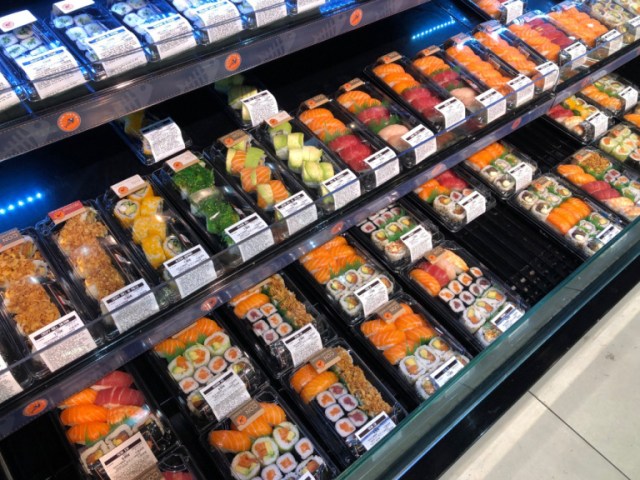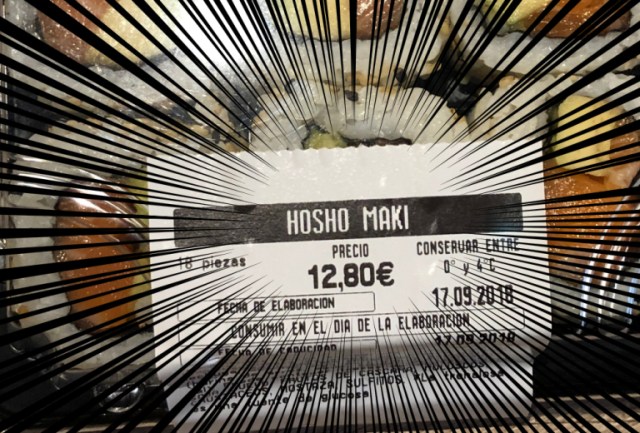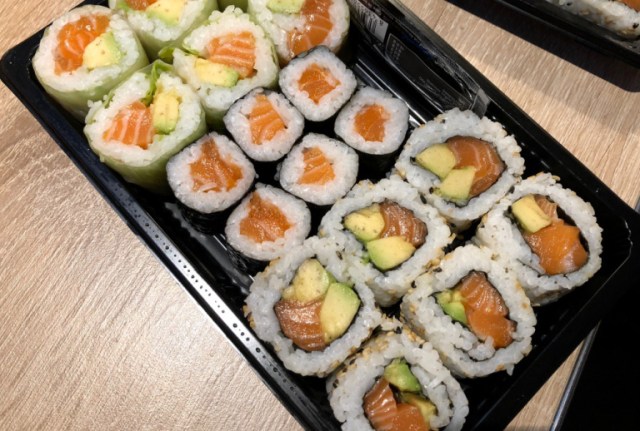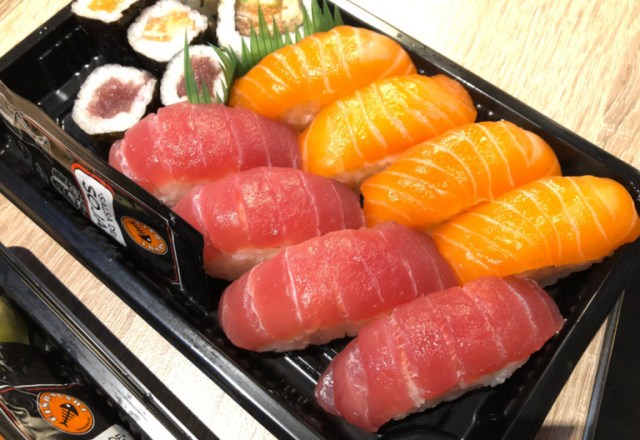
A strangely named sushi package grabbed our reporter’s attention, so of course he had to try it.
Sushi is a beloved local specialty in Japan, and it’s likely that few citizens would ever say no to a tasty, fresh meal of raw fish for lunch or dinner. They love that sushi is a dish that is very carefully and painstakingly prepared by specially trained chefs in Japan, which means they also know to temper their expectations somewhat when ordering sushi in other countries.
Our Japanese language reporter, Yuuchiro Wasai, has tried what turned out to be pretty terrible sushi in Cuba, so when he happened to see a display full of sushi in a Spanish supermarket while visiting Barcelona, he was a little skeptical. Spain is known for its tasty seafood…but do they know the proper methods for preparing fresh, raw fish?
His doubts increased when he read the labels on the packages of small sushi rolls:
It’s supposed to be “hoso maki”, not “hosho maki”! Yuuichiro almost laughed out loud when he read it. Spelling it as “hosho maki” is not only wrong, but it sounds like baby talk, since toddlers often say a “sh” sound instead of an “s” sound when they’re learning to speak Japanese.
That caught his attention, though, and he couldn’t seem to let them get away with that funny mistake without checking if the flavor matched the name, so he picked up a plate of “hosho maki” and a package of tuna and salmon nigiri (which was, incidentally, spelled correctly), and carted them off to his hotel to give them a taste. He was pretty sure it would be terrible sushi, and that he would have a funny story to tell later, so, oddly, he was kind of excited to try it.
But to his surprise, both types of sushi weren’t bad at all!
The fish was moderately fresh, and the rolls actually used Japanese rice. He wouldn’t say it was delicious, but it was probably about the same level of tastiness as Japanese supermarket sushi, which is pretty good. However, they were a little bit pricey by Japanese standards, at 12.80 Euro a pack (about 1,700 yen or US$15). In Japan, that price should fetch better quality sushi, but Yuichiro didn’t mind too much.
He was more impressed that the flavor didn’t match the misspelled name. Actually, he later learned, to his chagrin, that the Spanish language doesn’t have a sh” sound, so, barring the spelling, the supermarket essentially had the right naming all along. Plus, other sushi restaurants in Barcelona had “hosho maki” on their menu, too, so the spelling wasn’t even a mistake on the supermarket’s part. In the end, Yuuichiro learned a valuable lesson in culture and language, thanks to a box of sushi!
It’s always fun to find out how a foreign country does your favorite food, since you never know what you’re going to get. You might be disappointed, but on the other hand, you might end up like our other Japanese language reporter, who ordered a hamburger in Morocco and got a funny surprise instead!
Images © SoraNews24
[ Read in Japanese ]




 We try Keiji, an incredibly rare and expensive one-in-ten-thousand salmon sushi 【Taste test】
We try Keiji, an incredibly rare and expensive one-in-ten-thousand salmon sushi 【Taste test】 Our Japanese-language writers taste and compare sushi from around the world
Our Japanese-language writers taste and compare sushi from around the world Meat lovers, you can now satisfy your carnivorous cravings at this revolving sushi restaurant!
Meat lovers, you can now satisfy your carnivorous cravings at this revolving sushi restaurant! Sushi store makes waves in Japan for meal with a surprising 14-character katakana name
Sushi store makes waves in Japan for meal with a surprising 14-character katakana name We try a rotating sushi restaurant in New Delhi, are surprised to find no rotating sushi
We try a rotating sushi restaurant in New Delhi, are surprised to find no rotating sushi Japan’s new difficult-to-drink-from beer glass protects your liver, but it’s a brutal experience
Japan’s new difficult-to-drink-from beer glass protects your liver, but it’s a brutal experience Demon Slayer: Kimetsu no Yaiba gets new roller coaster attractions and food at Universal Studios Japan
Demon Slayer: Kimetsu no Yaiba gets new roller coaster attractions and food at Universal Studios Japan Come play hide-and-seek on a deserted Japanese island this August and November
Come play hide-and-seek on a deserted Japanese island this August and November New Pokémon ice cream, dessert drinks, and cool merch coming to Baskin-Robbins Japan【Pics】
New Pokémon ice cream, dessert drinks, and cool merch coming to Baskin-Robbins Japan【Pics】 How to order snacks on a Shinkansen bullet train in Japan
How to order snacks on a Shinkansen bullet train in Japan New samurai glasses are Japan’s latest weird must-have souvenir
New samurai glasses are Japan’s latest weird must-have souvenir Burger King Japan suddenly adds Dr. Pepper and Dr. Pepper floats to its menu nationwide
Burger King Japan suddenly adds Dr. Pepper and Dr. Pepper floats to its menu nationwide New Japanese rice cooker cuts carbohydrates at the push of a button
New Japanese rice cooker cuts carbohydrates at the push of a button Turns out you can draw all four original starter Pokémon with just three colored pencils【Video】
Turns out you can draw all four original starter Pokémon with just three colored pencils【Video】 New Nintendo Lego kit is a beautiful piece of moving pixel art of Mario and Yoshi【Photos】
New Nintendo Lego kit is a beautiful piece of moving pixel art of Mario and Yoshi【Photos】 Nintendo history you can feel – Super NES, N64, and GameCube controllers become capsule toys
Nintendo history you can feel – Super NES, N64, and GameCube controllers become capsule toys Hello, cosmetics! Clinique teams up with Hello Kitty this summer for first-time collaboration
Hello, cosmetics! Clinique teams up with Hello Kitty this summer for first-time collaboration “The most Delicious Cup Noodle in history” – Japan’s French Cup Noodle wins our heart【Taste test】
“The most Delicious Cup Noodle in history” – Japan’s French Cup Noodle wins our heart【Taste test】 Starbucks releases a cute Frappuccino and Unicorn Cake…but not in Japan
Starbucks releases a cute Frappuccino and Unicorn Cake…but not in Japan Kyoto Tower mascot termination reveals dark side behind cute Japanese characters
Kyoto Tower mascot termination reveals dark side behind cute Japanese characters McDonald’s Japan’s Soft Twist Tower: A phantom ice cream only sold at select branches
McDonald’s Japan’s Soft Twist Tower: A phantom ice cream only sold at select branches Yabai Ramen: What makes this Japanese ramen so dangerous?
Yabai Ramen: What makes this Japanese ramen so dangerous? Finally! Nintendo Japan expands Switch 8-bit controller sales to everybody, Online member or not
Finally! Nintendo Japan expands Switch 8-bit controller sales to everybody, Online member or not Japanese government wants to build luxury resorts in all national parks for foreign tourists
Japanese government wants to build luxury resorts in all national parks for foreign tourists To combat declining birth rate, Japan to begin offering “Breeding Visas” to foreigners
To combat declining birth rate, Japan to begin offering “Breeding Visas” to foreigners 10 things you should buy at 7-Eleven in Japan
10 things you should buy at 7-Eleven in Japan Studio Ghibli releases anime heroine cosplay dresses that are super comfy to wear
Studio Ghibli releases anime heroine cosplay dresses that are super comfy to wear Woman charged for driving suitcase without a license in Osaka
Woman charged for driving suitcase without a license in Osaka Studio Ghibli unveils My Neighbour Totoro miniature house model
Studio Ghibli unveils My Neighbour Totoro miniature house model Kyoto experiencing problems with foreign tourists not paying for bus fares, but not on purpose
Kyoto experiencing problems with foreign tourists not paying for bus fares, but not on purpose Fighting mild hunger with a Japanese soda that turns into jelly in the stomach【Taste test】
Fighting mild hunger with a Japanese soda that turns into jelly in the stomach【Taste test】 Studio Ghibli’s Howl’s Moving Castle tapestry unveiled in Japan for first time
Studio Ghibli’s Howl’s Moving Castle tapestry unveiled in Japan for first time McDonald’s new Happy Meals offer up cute and practical Sanrio lifestyle goods
McDonald’s new Happy Meals offer up cute and practical Sanrio lifestyle goods Sales of Japan’s most convenient train ticket/shopping payment cards suspended indefinitely
Sales of Japan’s most convenient train ticket/shopping payment cards suspended indefinitely Sold-out Studio Ghibli desktop humidifiers are back so Totoro can help you through the dry season
Sold-out Studio Ghibli desktop humidifiers are back so Totoro can help you through the dry season Japanese government to make first change to romanization spelling rules since the 1950s
Japanese government to make first change to romanization spelling rules since the 1950s Foreigner’s request for help in Tokyo makes us sad for the state of society
Foreigner’s request for help in Tokyo makes us sad for the state of society Ghibli founders Toshio Suzuki and Hayao Miyazaki contribute to Japanese whisky Totoro label design
Ghibli founders Toshio Suzuki and Hayao Miyazaki contribute to Japanese whisky Totoro label design Doraemon found buried at sea as scene from 1993 anime becomes real life【Photos】
Doraemon found buried at sea as scene from 1993 anime becomes real life【Photos】 Tokyo’s most famous Starbucks is closed
Tokyo’s most famous Starbucks is closed Princesses, fruits, and blacksmiths: Study reveals the 30 most unusual family names in Japan
Princesses, fruits, and blacksmiths: Study reveals the 30 most unusual family names in Japan Japan develops special sushi for pregnant women
Japan develops special sushi for pregnant women Our reporter dishes on the differences between sushi from Ginza Kyubey and Sushiro【Taste test】
Our reporter dishes on the differences between sushi from Ginza Kyubey and Sushiro【Taste test】 Which Japanese conveyor belt sushi chain has the best hamburger steak sushi?【Taste test】
Which Japanese conveyor belt sushi chain has the best hamburger steak sushi?【Taste test】 Supermarket sushi becomes a hot topic with foreigners on Reddit, but is it any good?
Supermarket sushi becomes a hot topic with foreigners on Reddit, but is it any good? Preserve your sushi’s form and your dignity with this one easy sushi-eating life hack【Pics】
Preserve your sushi’s form and your dignity with this one easy sushi-eating life hack【Pics】 Which Japanese conveyor belt sushi chain has the best salad sushi?【Taste test】
Which Japanese conveyor belt sushi chain has the best salad sushi?【Taste test】 Japan’s oldest sushi train serves up unorthodox Blueberry Cream Sushi
Japan’s oldest sushi train serves up unorthodox Blueberry Cream Sushi Hungry in Tokyo’s Ueno? This restaurant’s all-you-can-eat sushi bowl deal is all you need
Hungry in Tokyo’s Ueno? This restaurant’s all-you-can-eat sushi bowl deal is all you need Which Japanese conveyer belt sushi chain has the best steamed egg custard? 【Taste test】
Which Japanese conveyer belt sushi chain has the best steamed egg custard? 【Taste test】 Esteemed Japanese sushi chain ranks the top 15 most popular sushi toppings among customers
Esteemed Japanese sushi chain ranks the top 15 most popular sushi toppings among customers How to have a great meal at conveyer belt sushi chain Kura Sushi even if you hate raw fish
How to have a great meal at conveyer belt sushi chain Kura Sushi even if you hate raw fish Which Japanese conveyor belt sushi chain has the best squid sushi?【Taste test】
Which Japanese conveyor belt sushi chain has the best squid sushi?【Taste test】 We tried torching sushi with a “flamethrower” to increase its flavor! 【Video】
We tried torching sushi with a “flamethrower” to increase its flavor! 【Video】 Which Japanese conveyor belt sushi chain has the best egg sushi?【Taste test】
Which Japanese conveyor belt sushi chain has the best egg sushi?【Taste test】 Which Japanese conveyor belt sushi chain has the best mackerel sushi?【Taste test】
Which Japanese conveyor belt sushi chain has the best mackerel sushi?【Taste test】 Japanese restaurant combines solo shabu shabu dining with the fun of a sushi train
Japanese restaurant combines solo shabu shabu dining with the fun of a sushi train
Leave a Reply